Since June 2020, The Humane Society of the United States (HSUS) has come under public scrutiny over its failure to provide a humane retirement for the chimpanzees at Project Chimps, its sanctuary in Georgia that is home to 82 former lab chimpanzees. When, in 2020, whistleblowers and animal rights groups, including the Nonhuman Rights Project and PETA, began calling on HSUS to improve welfare conditions, HSUS took steps to distance itself from the sanctuary instead of fulfilling its obligations to the chimpanzees.
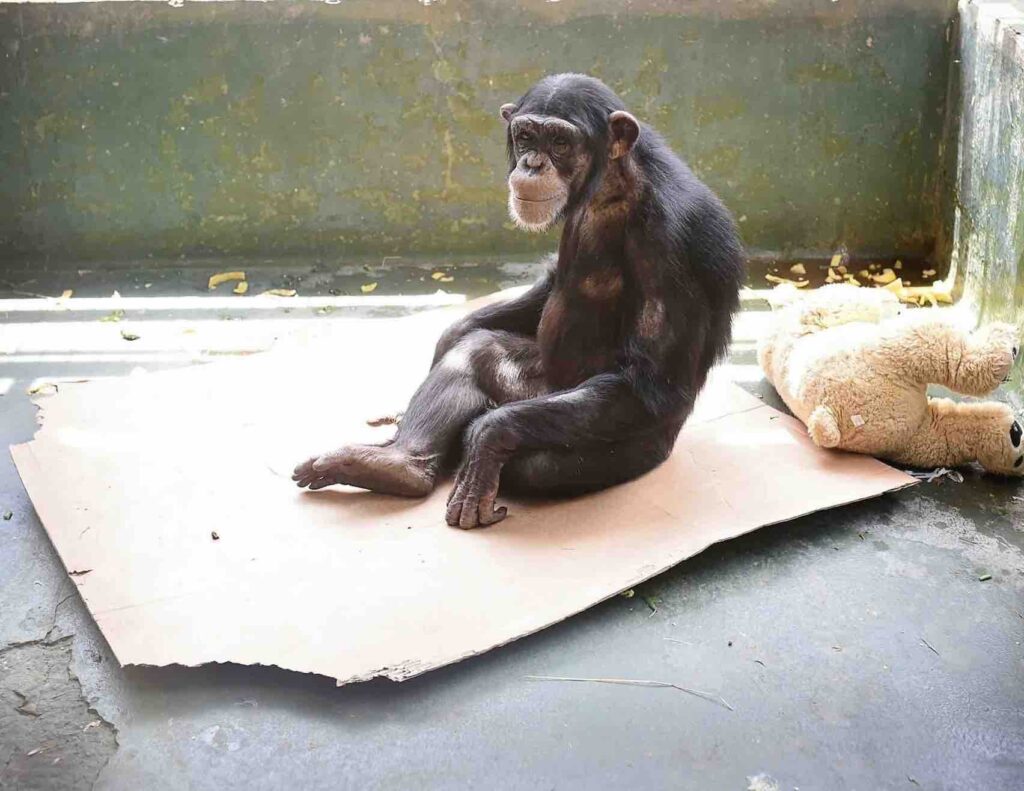
Project Chimps, a Humane Society of the United States chimpanzee sanctuary in Georgia that has been in the spotlight since 2020 over poor animal welfare conditions.
The following report details the conflicts of interest and obfuscation that have enabled HSUS to provide substandard care to the chimpanzees while giving the public the impression that Project Chimps is a true sanctuary. It also describes HSUS’s obligation to the approximately 110 chimpanzees waiting to be rescued from the New Iberia Research Center, a laboratory at the University of Louisiana.
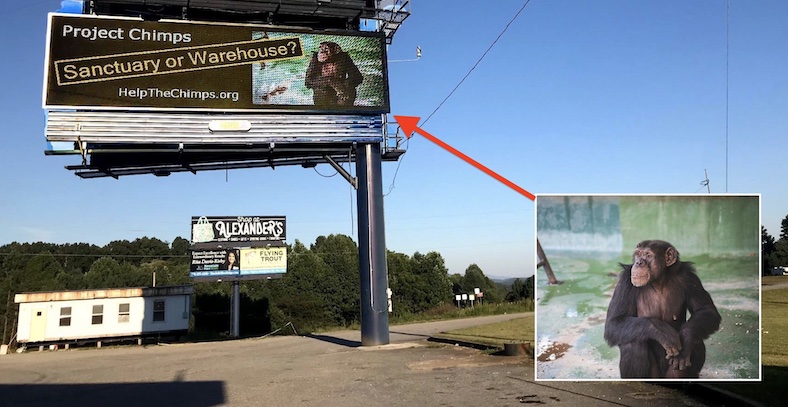
Whistleblowers and animal rights groups erected a billboard near Project Chimps to raise awareness of the plight of the chimpanzees at the HSUS sanctuary.
Who are the stakeholders?
New Iberia Research Center (NIRC) – The NIRC is a biomedical research facility at the University of Louisiana that, until 2015, bred chimpanzees, used them in experiments and leased them to other laboratories. When chimpanzee research in the United States ended in 2015, NIRC retired the 220 chimpanzees that it owned in the laboratory itself.
Project Chimps – Project Chimps is a Humane Society of the United States (HSUS) sanctuary in Northern Georgia that was incorporated in 2014 and is home to chimpanzees owned by NIRC. The original contract between Project Chimps and NIRC, signed in 2015, indicates that Project Chimps intended to transfer all 220 chimpanzees from NIRC to the sanctuary by the end of 2020.
The Humane Society of the United States (HSUS) – HSUS is a Washington, D.C.-based animal protection organization. With annual revenues of between $125 and $160 million, it is the wealthiest animal protection organization in the world. In 2020, HSUS had over $284 million in net assets and spent $28.4 million in fundraising. That year, Forbes ranked HSUS number 78 on its list of the wealthiest 100 charities in the United States.
The Global Federation of Animal Sanctuaries (GFAS) – GFAS is a Washington, D.C.-based non-profit that sets standards that sanctuaries must meet in order to receive its coveted accreditation. Since being founded in 2007 by two HSUS executives (and two others who were not affiliated with HSUS), GFAS has had close administrative and financial ties to HSUS.
How was Project Chimps created?
In 2014, Sarah Baeckler and Bruce Wagman, both of whom were attorneys and chimp advocates, met with the University of Louisiana to ask if it would release the 220 chimps it owned at NIRC to a sanctuary. When the university agreed, they incorporated Project Chimps, and Wagman became the Chairman of the Board. As an outside attorney for HSUS, Wagman had a close working relationship with the organization and solicited its support in the expensive endeavor of creating Project Chimps.
In 2015, HSUS helped Project Chimps purchase a defunct gorilla sanctuary in Georgia that would serve as Project Chimps’ home. In exchange, HSUS took over a majority of seats on Project Chimps’ Board of Directors and “fully integrated” the sanctuary into the organization.
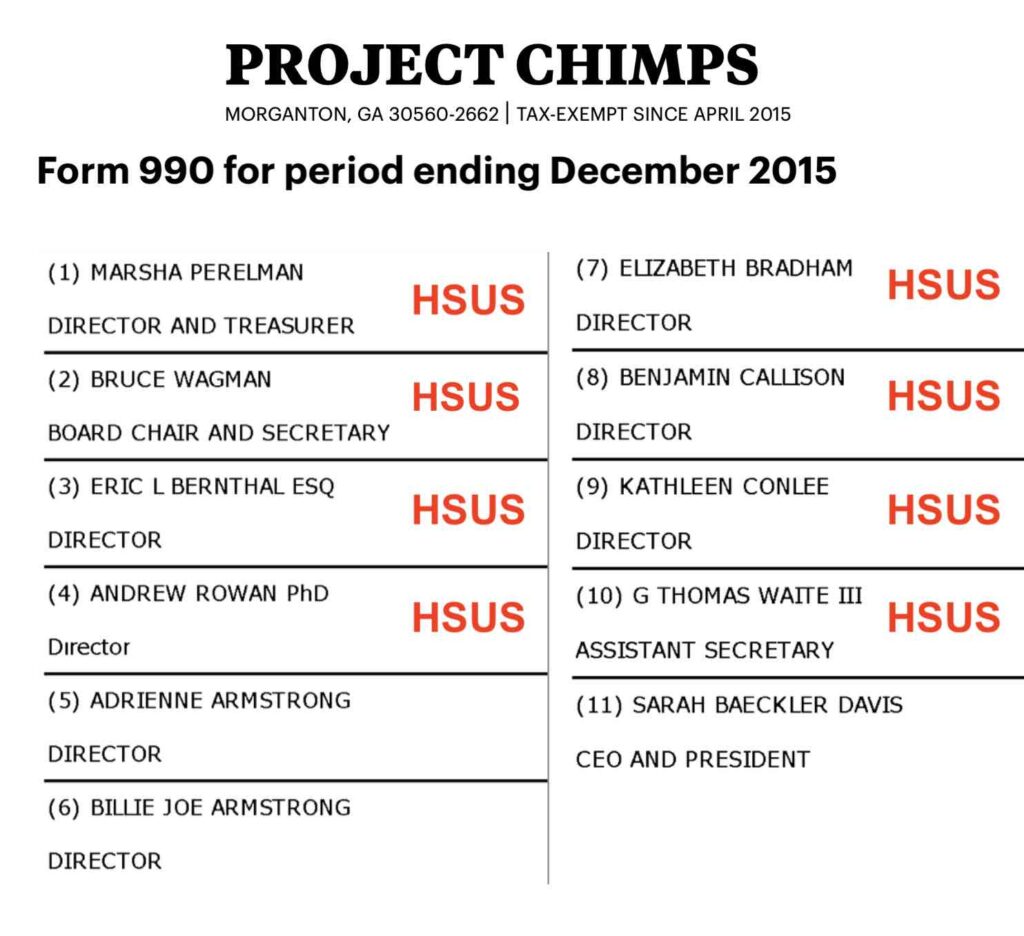
After Project Chimps was incorporated, the Humane Society of the United States (HSUS) took control of its Board of Directors, thereby taking responsibility for the welfare of the 220 chimpanzees that Project Chimps committed to rescuing from the New Iberia Research Center (NIRC) at the University of Louisiana.
In December 2015, the University of Louisiana and Project Chimps signed a contract that stipulated that the University would pay Project Chimps up to $19,000 for each of the 220 chimps it took over a five-year period. After five years, Project Chimps would have to pay the University a penalty of $42.24/day for every chimp it left behind. Project Chimps therefore had a strong financial incentive to take in all 220 chimps within five years (by the end of 2020).
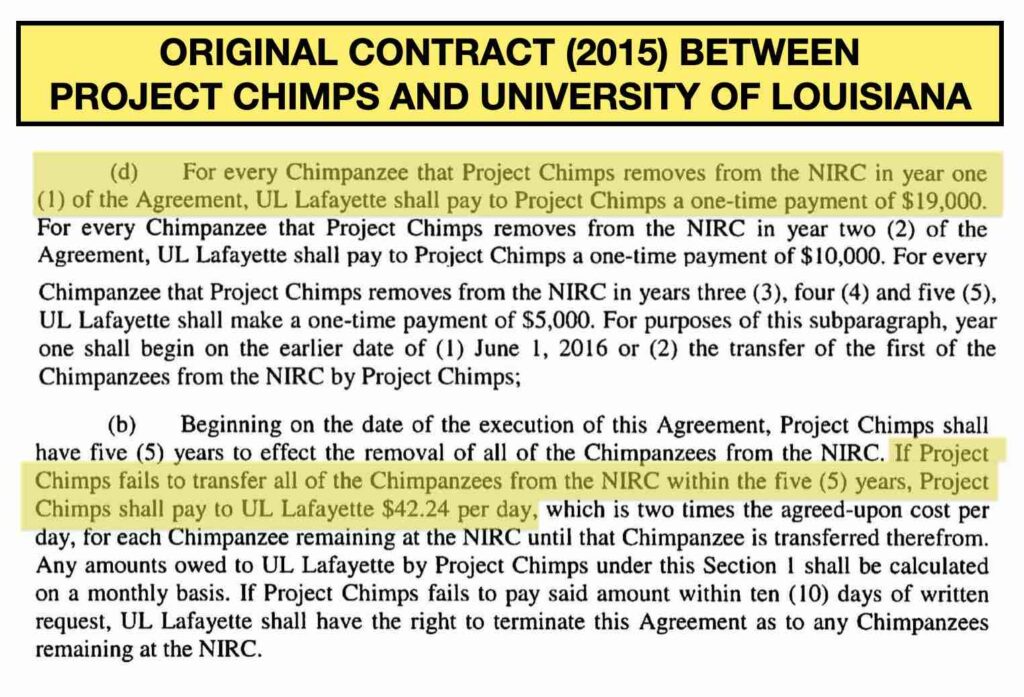
The 2015 contract between the University of Louisiana and Project Chimps. The contract was amended in 2019 to remove the penalty and the understanding that Project Chimps would take all 220 chimpanzees.
By the end of 2019, Project Chimps had taken in 80 of the reported 220 chimps at NIRC. If it didn’t rescue the remaining NIRC chimps by the end of 2020, then it would have to pay the University a penalty of approximately $177,000/month, according to the contract. In July 2019, however, the University removed the penalty from the contract, eliminating any sense of urgency around expanding Project Chimps to accommodate the remaining NIRC chimpanzees. The amended contract also removed the language indicating that Project Chimps would take all of the chimpanzees. These significant changes to the contract, which appear to be an attempt by HSUS to minimize its expenses associated with expanding Project Chimps, could sentence many of the remaining NIRC chimps to life in the lab.
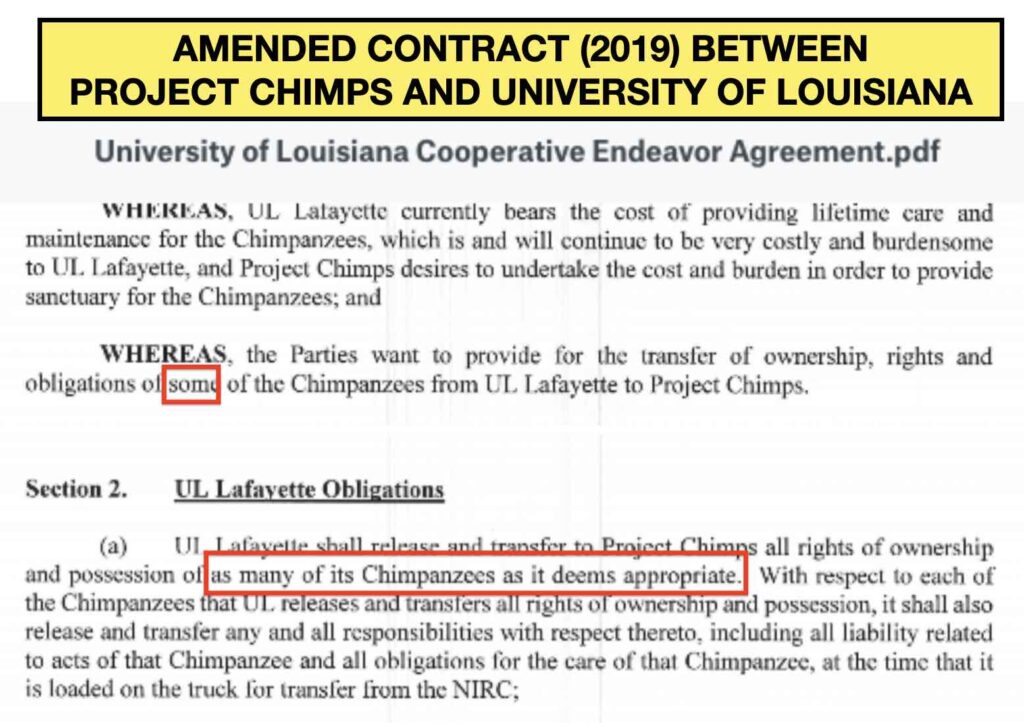
The revised contract between between Project Chimps and the University of Louisiana could sentence chimpanzees to life at the lab because it removed the language indicating that Project Chimps would rescue all 220 of them, and it removed the penalties to Project Chimps associated with leaving chimpanzees behind.
Today, Project Chimps has just 82 of the approximately 220 NIRC chimpanzees.
What is the relationship between HSUS and Project Chimps?
Project Chimps is an HSUS affiliate, and the organizations are operationally intertwined. HSUS manages Project Chimps’s Information Technology department; pays its Executive Director; and files its tax returns. According to internal documents, Project Chimps employees are “HSUS professionals.” In 2017, the sanctuary’s Executive Director Ali Crumpacker sent an email to the staff indicating that Project Chimps would soon be “fully integrated” into HSUS.
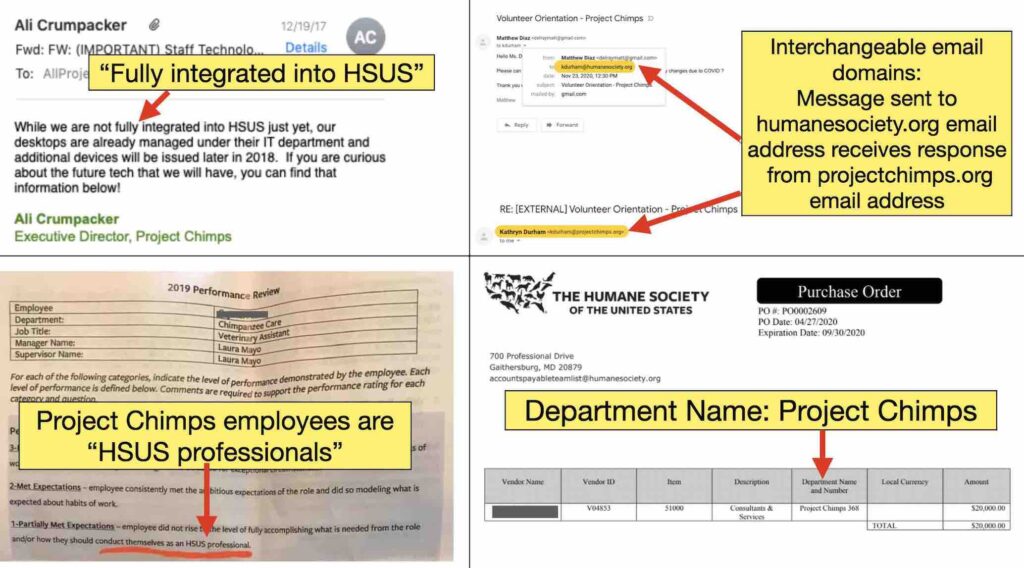
In an apparent attempt to absolve itself of its financial commitments to the chimpanzees and distance itself from the animal welfare controversy, HSUS has publicly claimed that Project Chimps is independent despite that fact that it has been “fully integrated” into HSUS since 2017 and despite the evidence that proves that Project Chimps is an HSUS affiliate.
In 2020, HSUS controlled 7 of the 11 seats on Project Chimps’s Board of Directors.
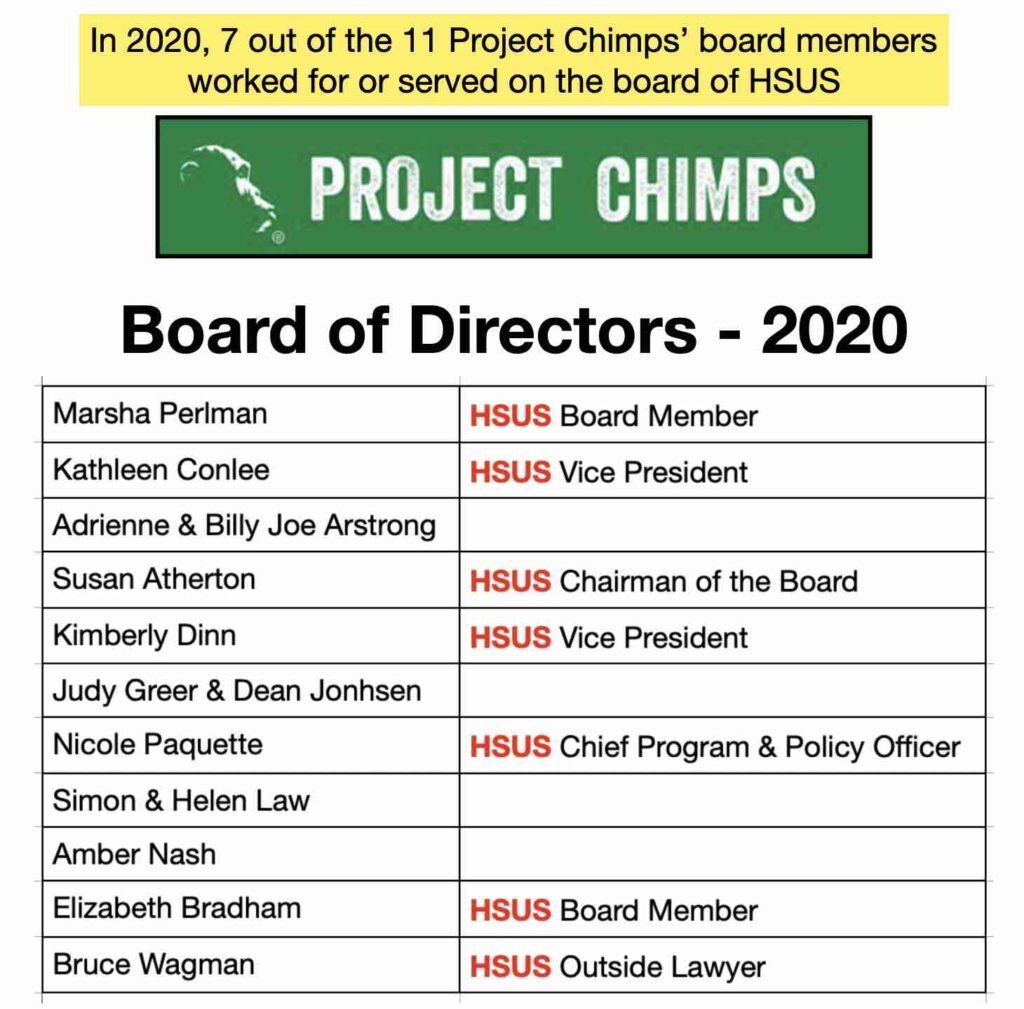
In 2020, HSUS held 64% of the seats on Project Chimps Board of Directors while simultaneously claiming that it did not have decision making power and that it merely provided financial support to the sanctuary.
When, in 2020, animal rights organizations began calling on HSUS to improve living conditions and animal care at Project Chimps, HSUS attempted to distance itself from the sanctuary – and its obligations to the chimpanzees – by removing several members of its leadership team from the sanctuary’s Board of Directors. It also claimed that it was merely a financial supporter of Project Chimps, despite the evidence proving that the sanctuary had been fully integrated into HSUS.
Today, four HSUS leaders have a seat on the board of Project Chimps. In order to give the public the impression that HSUS has fewer seats on the board than it does, Project Chimps removed reference to HSUS from two of their bios.
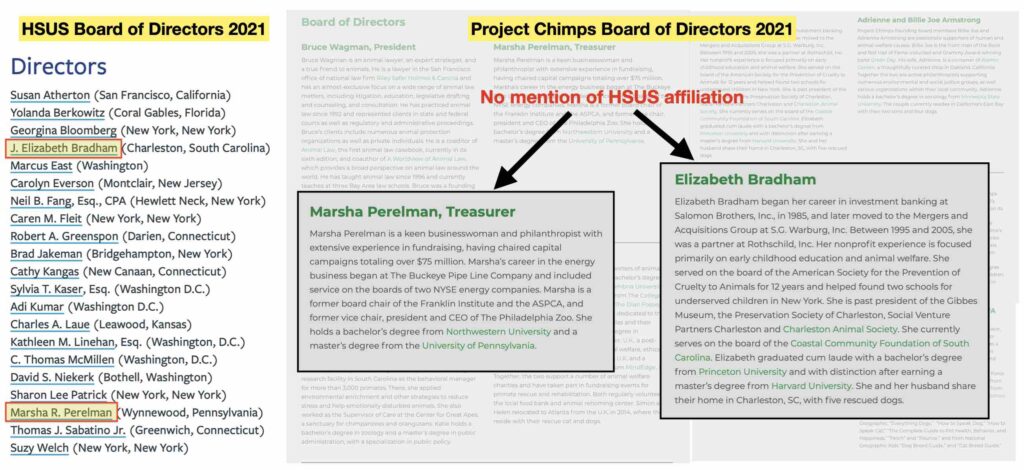
Reference to HSUS was removed from the bios of Marsha Perelman and Elizabeth Bradham, giving the public the impression that HSUS has fewer seats on the board – and exerts less influence over Project Chimps – than it does.
Despite of the evidence demonstrating its control over Project Chimps, HSUS is now claiming on its tax return that it has no operational control over its sanctuary.
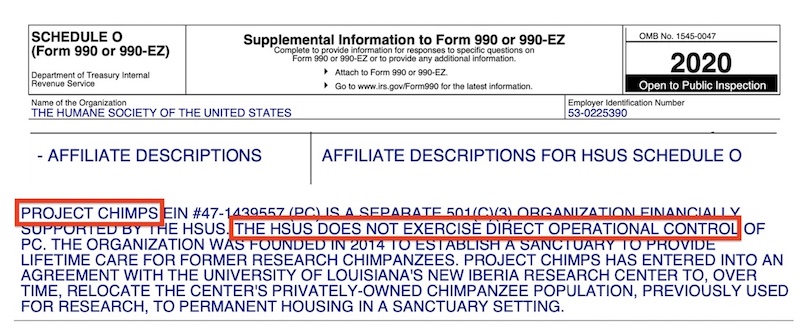
Despite all of the evidence demonstrating otherwise, HSUS claims on its 2020 tax return that it has no operational control over Project Chimps.
Given HSUS’s vast wealth, why does animal welfare at Project Chimps fall short of the standards set by the North American sanctuary community?
Project Chimps posts photos on social media that show chimpanzees enjoying a lush outdoor habitat and living their best possible lives in a captive setting, The day-to-day reality, however, is much different.
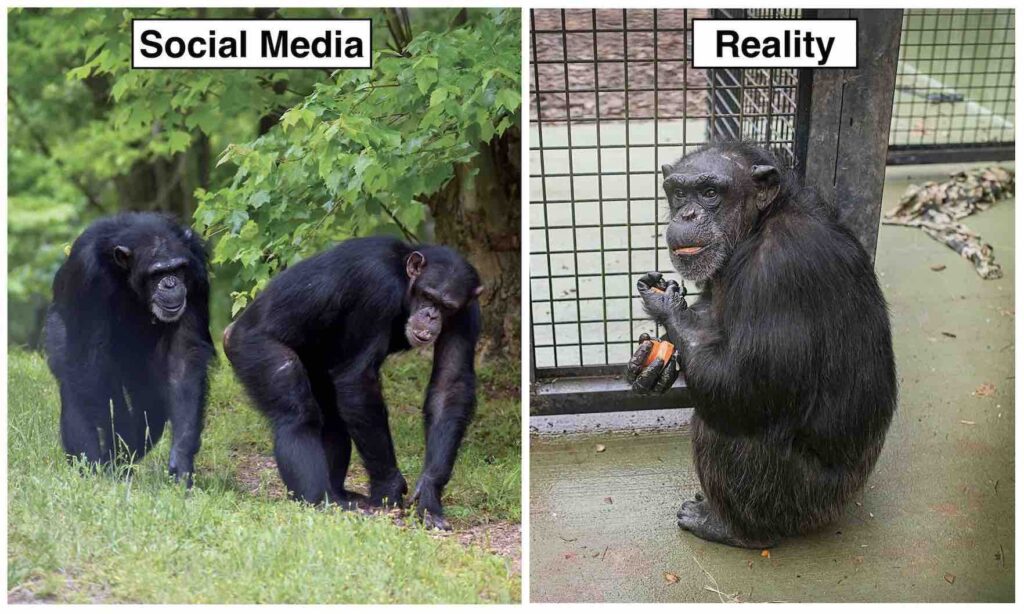
The 82 chimpanzees at HSUS sanctuary Project Chimps have access to the outdoors just once every three days, but Project Chimps’ public statements and social media posts suggest that they spend every day in a natural setting.
Project Chimps sits on 236 forested acres. Only six of them (2.5%), however, serve as outdoor space for the chimps. This outdoor area, referred to as the “habitat,” is divided into two yards, each of which can accommodate one group of chimps at a time. With six chimpanzee groups sharing two yards, each group has access to the habitat just once every three days (for four to six hours). The chimpanzees spend the rest of the time in covered, concrete rooms that have one or two open-air walls with metal bars. Because Project Chimps describes these concrete and metal enclosures as “outdoor porches,” the public is led to believe that the chimpanzees spend seven days a week outside in a natural setting.
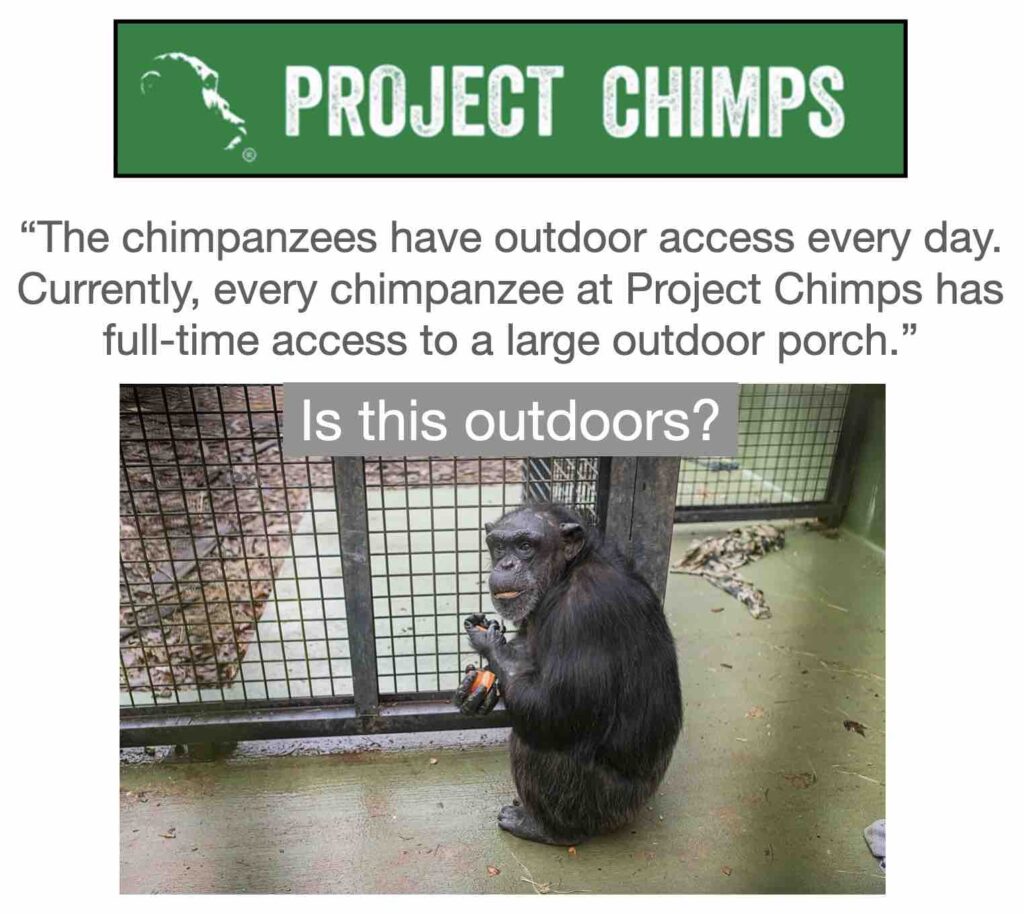
Whistleblowers and animal rights activists assert that HSUS and Project Chimps are misleading donors and the public by describing the concrete rooms where the chimpanzees spend their days as “outdoor porches.”
According to Project Chimps’ strategic plan, HSUS should have created three additional habitats at Project Chimps by now, but it hasn’t broken ground on any of them. HSUS hasn’t even announced a timeline for this desperately needed expansion.
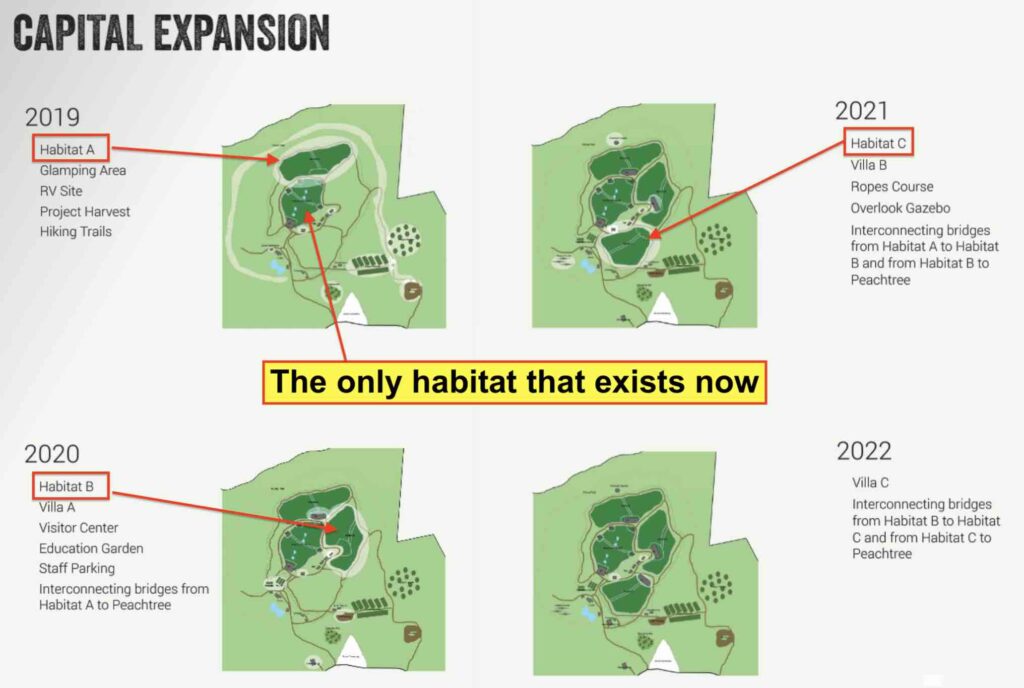
HSUS was supposed to have created three additional habitats (A, B and C) by 2021, but it hasn’t created any. As a result, the 82 chimps rotate into the one habitat just once every three days for part of the day.
Despite the fact that sanctuaries are supposed to prioritize the needs of the animals, Project Chimps recently created hiking trails and banquet facilities for visitors.
The lack of sufficient habitat space for the chimpanzees begs several questions:
- Why didn’t HSUS create enough habitat space at Project Chimps in 2015, before it began bringing in chimpanzees from NIRC. And why, more than five years later, hasn’t HSUS announced a timeline for new habitats?
- Why does HSUS CEO Kitty Block blame COVID for the delay in creating additional habitats when HSUS should have broken ground on them several years before the pandemic?
- With its enormous wealth, why does HSUS allow Project Chimps to remain a substandard facility compared to other chimpanzee sanctuaries in North America?
- Why is HSUS withholding funds to improve and expand Project Chimps for the chimpanzees who are already there and for the 110 chimpanzees who are waiting to be rescued from NIRC? Twenty-six chimps have already died at NIRC while waiting.
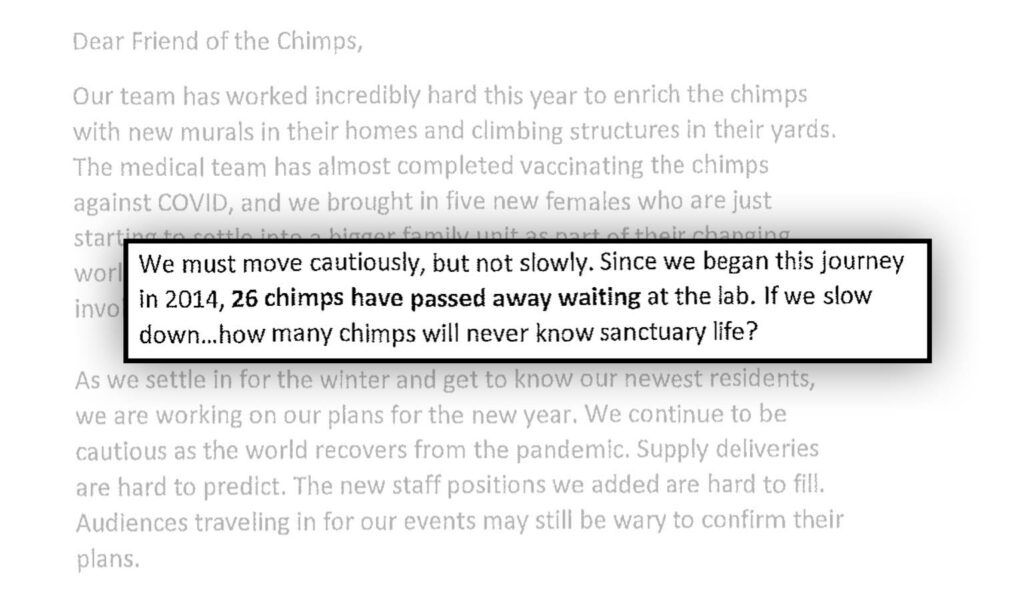
According to Project Chimps, 26 chimpanzees have died at NIRC while waiting to be rescued. If HSUS had expanded Project Chimps when it took over its Board of Directors in 2015, then many of these chimps could have spent their final years in a sanctuary setting.
In May 2020, 22 employees and volunteers at Project Chimps wrote a letter to Bruce Wagman, the Chairman of the Board, to express their concerns about the lack of outdoor space and other serious welfare deficiencies. After Wagman dismissed their concerns, two former employees, Crystal Alba and Lindsay Vanderhoogt, launched a website, HelpTheChimps, which exposed not only their grim day-to-day lives in concrete rooms, but also poor veterinary care and pervasive neglect. An inspection report written by primatologist Dr. Steve Ross, a chimpanzee behavior specialist, and an investigative story published in National Geographic corroborated some, if not many, of the whistleblowers’ allegations.
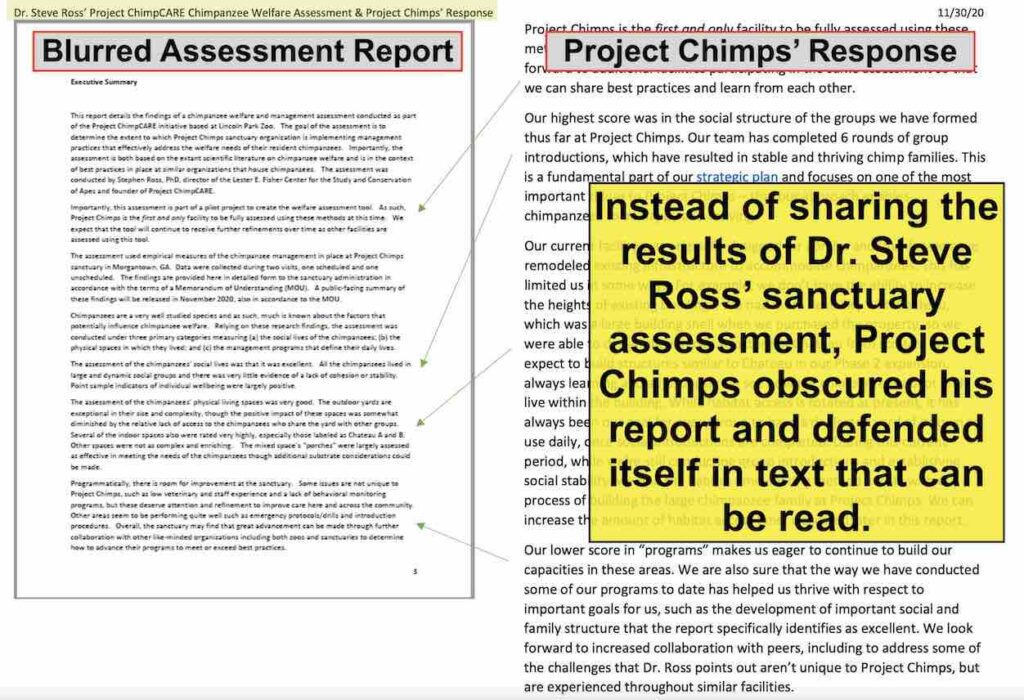
Despite the fact that Project Chimps received a D on its welfare management programs at Project Chimps, HSUS uses Dr. Steve Ross’ assessment of the sanctuary to defend against allegations of poor animal welfare conditions. Project Chimps blurred the report so that people who see it will read its reaction instead of the report itself.
In July, 2021, HSUS CEO Kitty Block publicly acknowledged the need for additional yards at Project Chimps, but she did not specify when HSUS would create them. In a response to advocates who contacted her about the issue, Block blamed “COVID” and “weather” for the delay, despite the fact that the chimpanzees have been living in these conditions since 2016.

HSUS CEO Kitty Block’s response to advocates calling on her to create additional yards at Project Chimps so that the 82 chimpanzees have daily access to the outdoors. She and Susan Atherton, HSUS’s board chair who also had a seat on the board of Project Chimps until 2020, have ignored the pleas of whistleblowers and advocacy groups to improve animal welfare at Project Chimps.
Why is Project Chimps accredited?
According to the Global Federation of Animal Sanctuaries (GFAS), great apes who live at sanctuaries that it accredits should be “able to enjoy lives that are as close as possible to that of their wild counterparts.” Despite the fact that Project Chimps does not meet this and many other GFAS standards, GFAS continues to accredit the HSUS sanctuary. HSUS, in turn, uses this accreditation to dismiss criticism and discredit those advocating for better conditions. Neither GFAS nor HSUS has disclosed, however, the conflicts of interest between the organizations — GFAS is comprised of people affiliated with HSUS; is partially funded by HSUS; and has administrative ties to HSUS. In fact, the GFAS domain name is managed by HSUS.

Advocates assert that GFAS cannot objectively assess Humane Society of the United States (HSUS) sanctuaries if HSUS funds GFAS, manages its domain and shares staff members and board directors,
GFAS was founded in 2007 by four individuals, two of whom worked for HSUS. Mike Markarian was HSUS’s Chief Operating Officer, and Adam Roberts was the treasurer of HSUS’s political action committee. From 2008 to 2015, Roberts was the President of Board of GFAS, and Markarian was the Vice President. From 2016 to 2019, Roberts was the Secretary. In 2019, he became the Board president again. While 2020 tax documents are not yet public, the GFAS website lists both Roberts and Markarian as board members today. In fact, 40% of GFAS’s current board is comprised of executives who work – or worked – for HSUS.
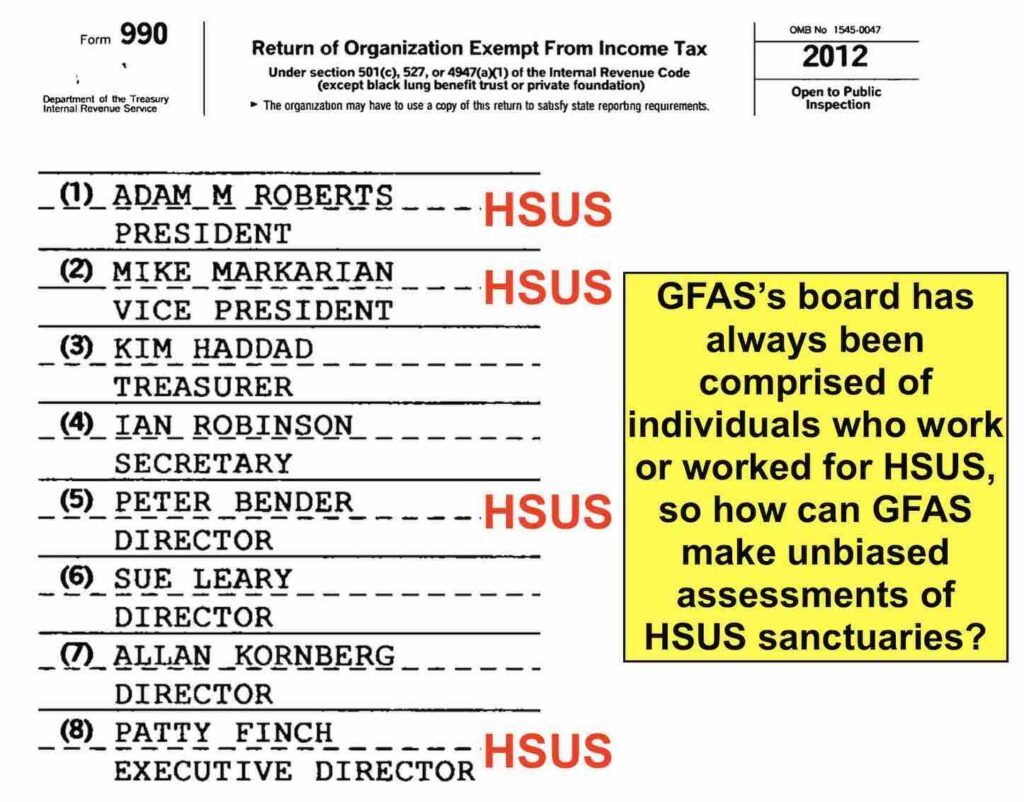
Since GFAS was incorporated in 2007, its Board of Directors has been comprised in large part by current and former HSUS leaders. Given that GFAS is charged with inspecting HSUS sanctuaries, HSUS’s representation on GFAS’s board represents a conflict of interest.
In 2008, a former Executive Director of a division of HSUS (the National Association for Humane and Environmental Education) became the Executive Director of GFAS. This former HSUS executive, Patty Finch, held the top staff position at GFAS from 2008 to 2013.
GFAS and HSUS have attempted to erase some of their connections in order to minimize the appearance of a conflict of interest and to help GFAS maintain a veneer of independence. For instance, the biography of Adam Roberts on GFAS’s website omits his work for HSUS, and the biography of GFAS board member Melissa Rubin omits her 31 years of employment at HSUS. In fact, it only lists a job that she has held for nine months.
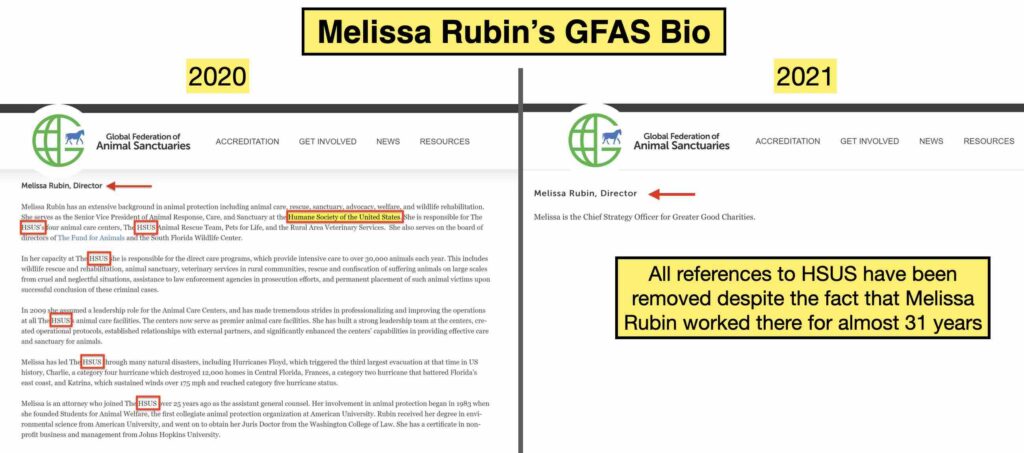
Melissa Rubin’s biography on the GFAS website omits her almost 31 years of employment at HSUS. This removal of her HSUS career minimizes the appearance of the conflict of interest between GFAS and HSUS.
Following are examples of other GFAS board members and executives who have – or had – close ties to HSUS:
- GFAS board member Nicole Paquette is Chief Programs and Policy Officer for HSUS. (Paquette also had a seat on the board of Project Chimps until 2020.)
- GFAS executive Grettel Delgadillo is a Program Coordinator for HSI, a division of HSUS.
- GFAS executive Kristin Leppert was formerly employed by HSUS. (In 2020, Leppert inspected Project Chimps on behalf of GFAS)
- Former HSUS board member Peter Bender served on the board of GFAS from its inception until 2020.
These financial, staffing and administrative conflicts of interest between GFAS and HSUS compromise GFAS’s ability to make unbiased assessments of an HSUS sanctuary. In order to remain credible and avoid diminishing the value of its accreditation, GFAS should publicly disclose its conflicts of interest with HSUS and recuse itself from inspecting HSUS sanctuaries.
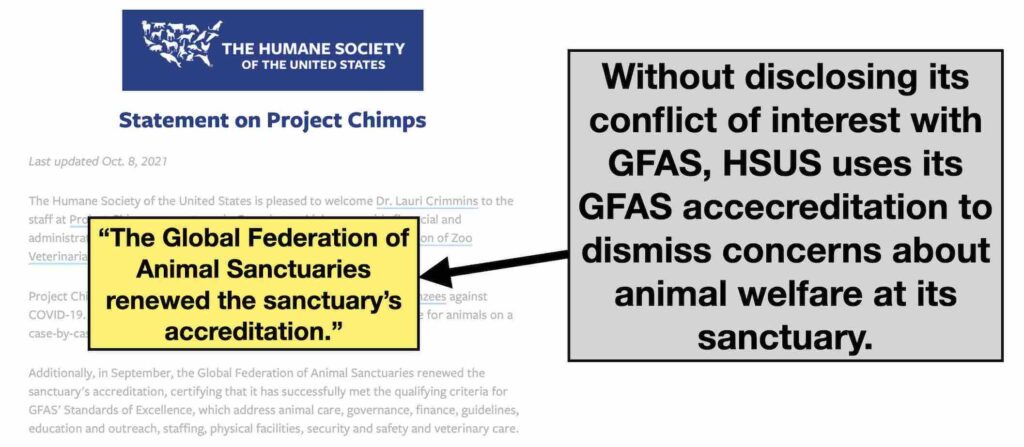
In public statements using its GFAS accreditation to dismiss concerns about animal welfare at its sanctuary, The Humane Society of the United States (HSUS) doesn’t disclose its conflicts of interest with GFAS.
In April 2021, TheirTurn published a story describing in detail the conflict of interest between HSUS and GFAS.
In recent years, GFAS suspended its accreditation from two other primate sanctuaries that did not meet its standards, Chimps Inc and Jungle Friends. Advocates believe it would have suspended the accreditation of Project Chimps too if it didn’t have a conflict of interest with HSUS.
What is HSUS’s Obligation to the Chimps?
When HSUS took control of the board of Project Chimps in 2015, it made a commitment to fulfill the sanctuary’s mission to provide humane retirement to the 220 chimpanzees at NIRC. As part of that commitment, HSUS should have built enough housing structures to accommodate all of the NIRC chimpanzees and created enough habitat space to enable them to have daily access to the outdoors. By reneging on its commitment and by distancing itself from Project Chimps, HSUS has betrayed the chimpanzees, its fiduciary duties and its obligations to its affiliate sanctuary.

As the 78th most wealthy charity in the United States, the Humane Society of the United States (HSUS) has the resources to expand its Project Chimps sanctuary to humanely accommodate the 82 chimps who are already there and the approximately 110 chimps waiting to be rescued from NIRC.
Save The Chimps, a sanctuary in Florida that has approximately 230 chimpanzees, is backed by The Arcus Foundation. Similarly, Chimp Haven, a sanctuary in Louisiana with more than 300 chimpanzees, receives 75% of its chimp care funding from the NIH. In order to rescue the approximately 110 chimpanzees who remain at NIRC and to humanely accommodate the 82 chimpanzees who are already at the sanctuary, Project Chimps also needs financial backing. HSUS made a commitment to do so. And it has the resources. Over the past several years, HSUS has raised millions of dollars off of the plight of captive chimpanzees and, according to an inside source, it recently received a $100 million estate gift from a donor who had an affinity for chimpanzees.
Instead of misleading the public about conditions at Project Chimps, attempting to extricate itself of its obligations and making excuses for it hasn’t expanded Project Chimps, HSUS must use a fraction of its substantial wealth to break ground on new habitats and transform the 236 acre forested property into a true sanctuary that meets and exceeds the standards of other North American chimpanzee sanctuaries provide. The chimpanzees have already waited far too long for a safe, natural and enriched life.
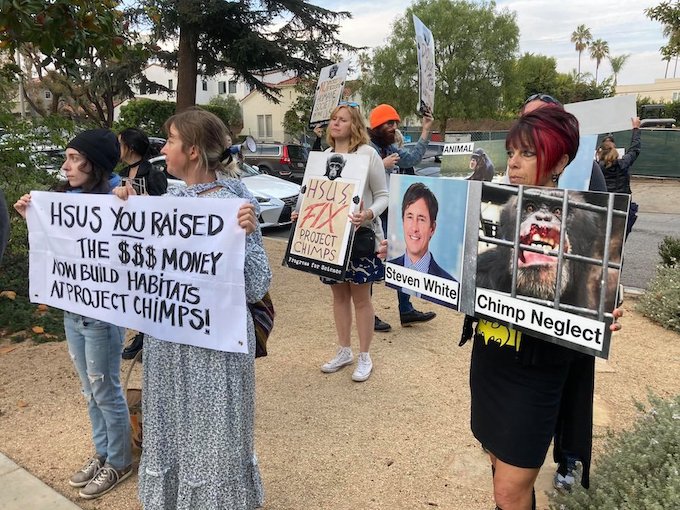
In 2020 and 2021, animal rights activists with Progress for Science staged multiple protests at the Los Angeles home of HSUS board member Steven White. White is no longer listed as a board member, but activists argue that his decision to step down or remove his name from the list did nothing to help the chimpanzees who he neglected while he had a seat.
People around the world have been frustrated about the pandemic “lockdowns” despite the fact that most have been able to enjoy the outdoors and the comforts of home. If we feel like our freedoms have been compromised, then imagine the stress experienced by the chimpanzees who have spent up to five years largely confined in concrete rooms at Project Chimps and up to several decades in a laboratory before that.
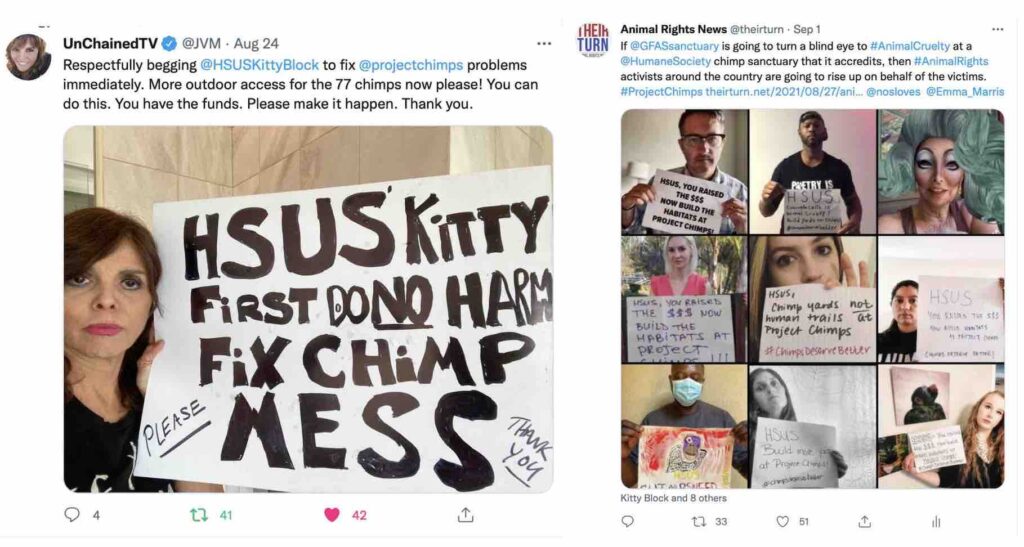
After Project Chimps sued the whistleblowers who exposed substandard living conditions, poor veterinary care animal other forms of neglect at the sanctuary, animal rights activists and national animal rights groups, including PETA and the Nonhuman Rights Project, began calling on HSUS to improve its facility.
*If you know of any information in this report or previous or future articles on this topic to be inaccurate, please contact us with documentation.
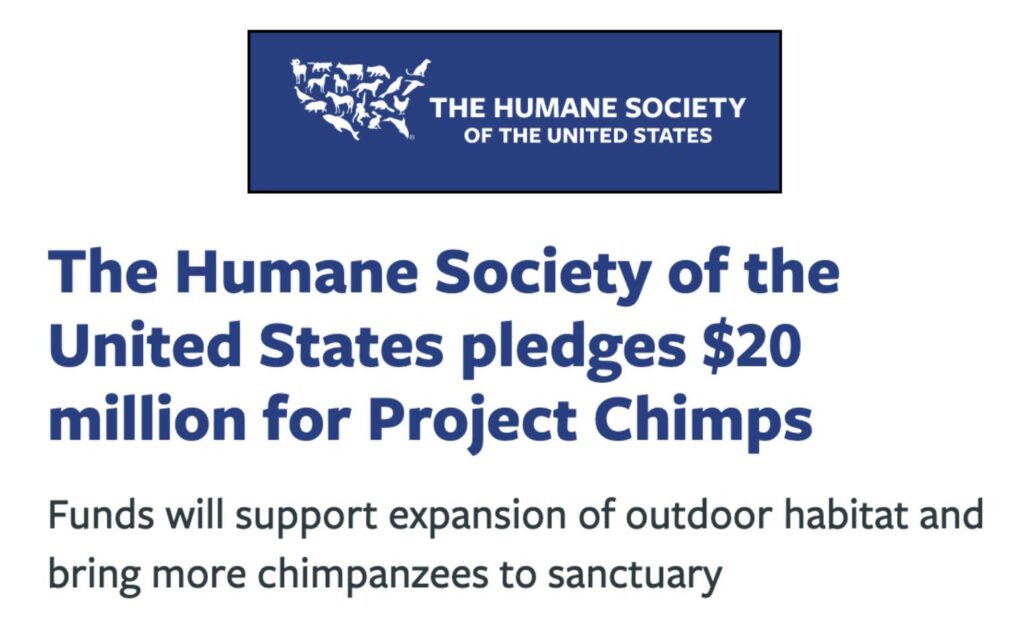
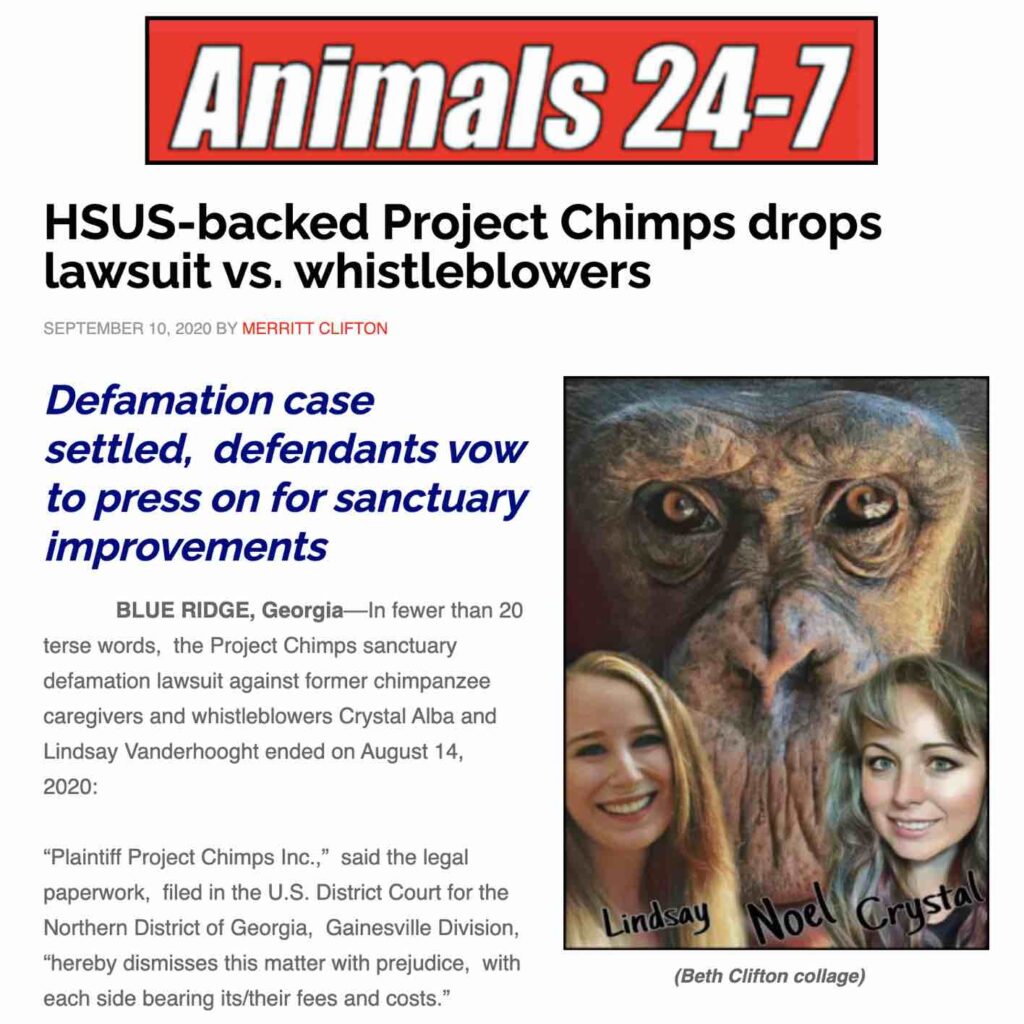
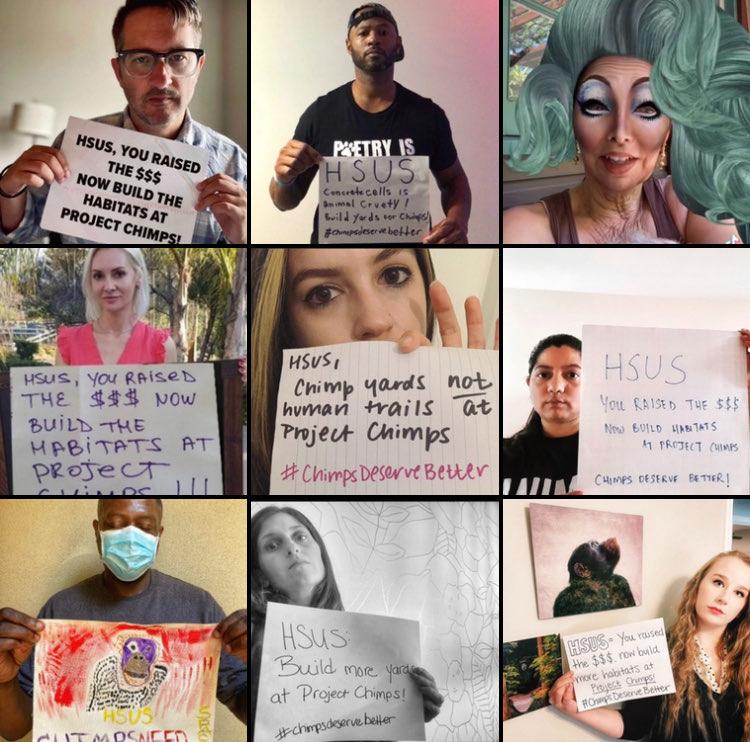



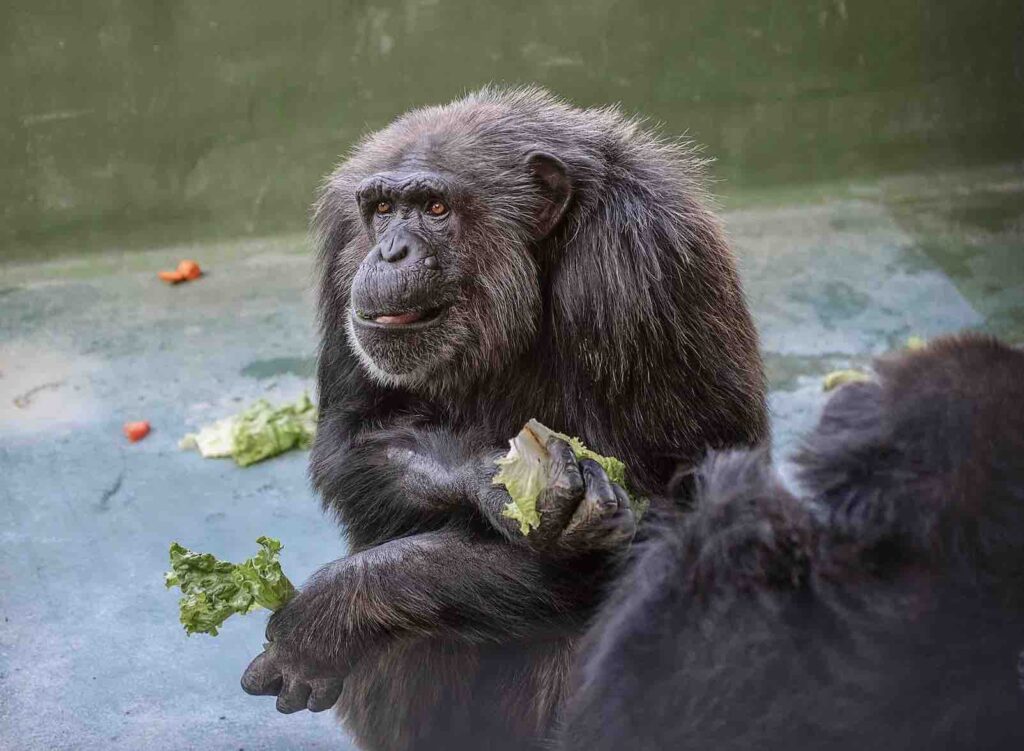






















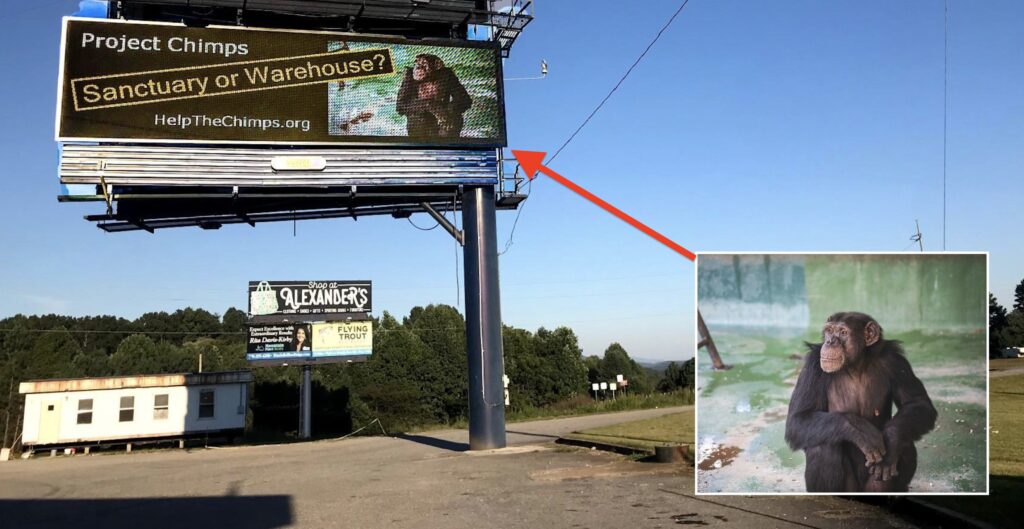
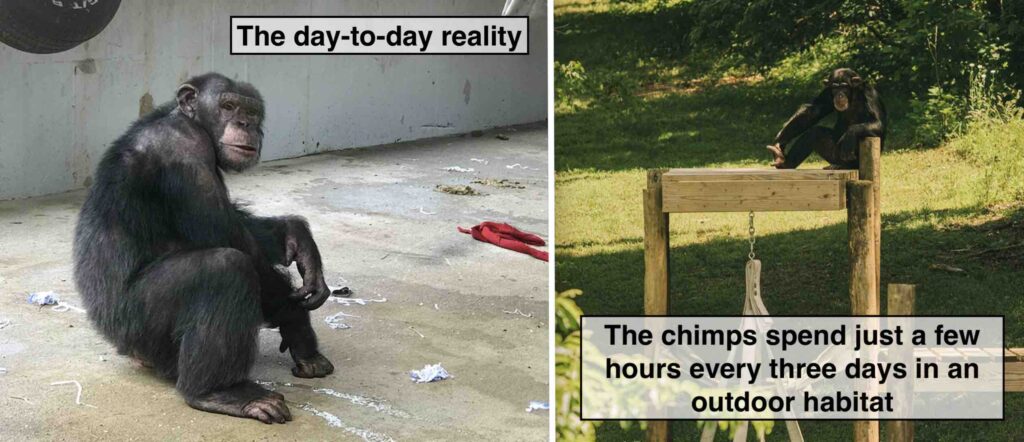
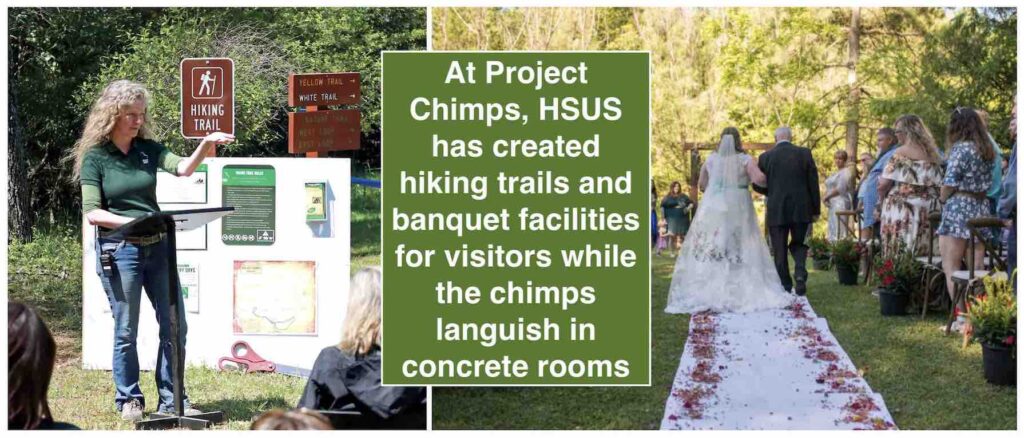
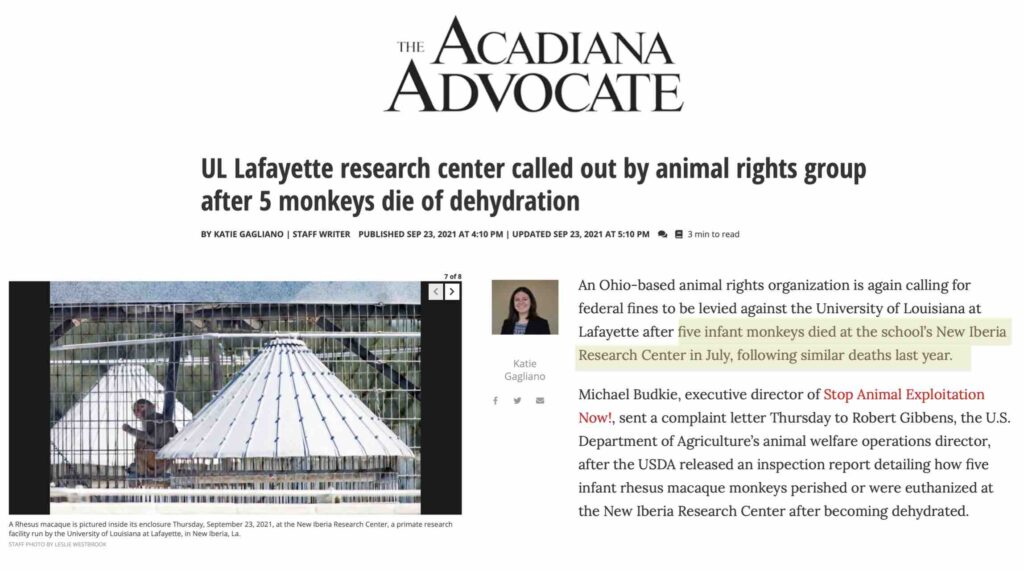
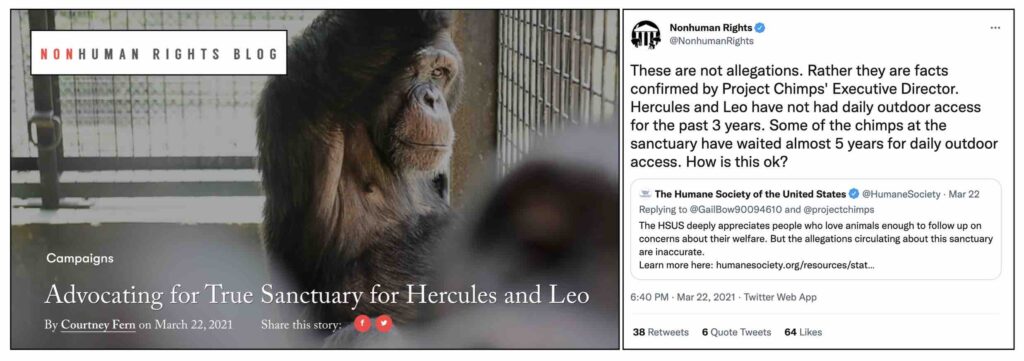
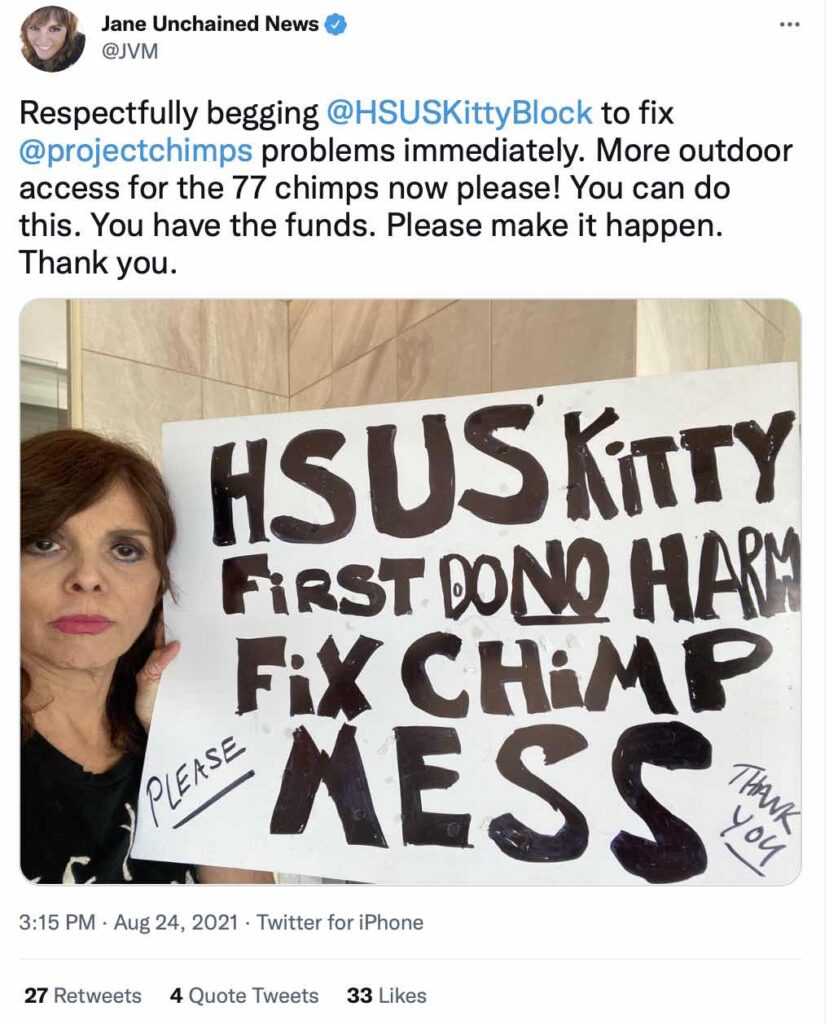
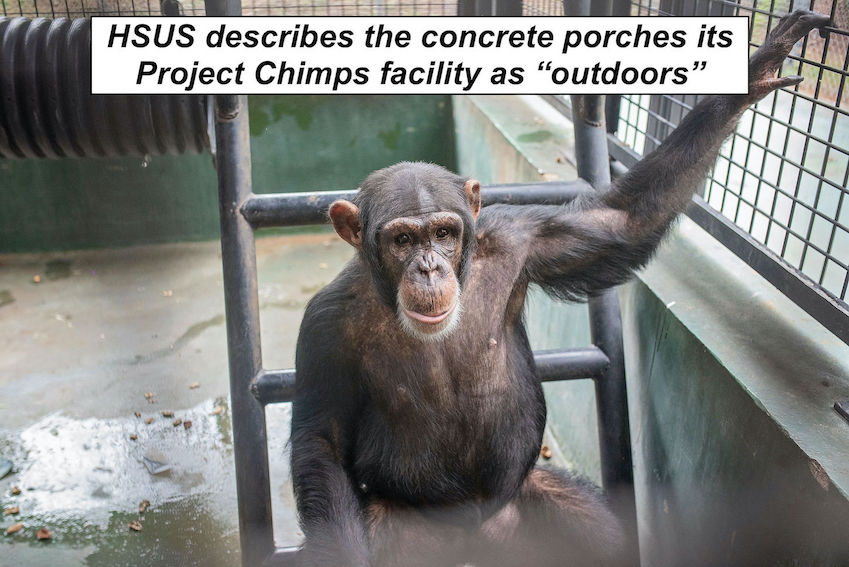

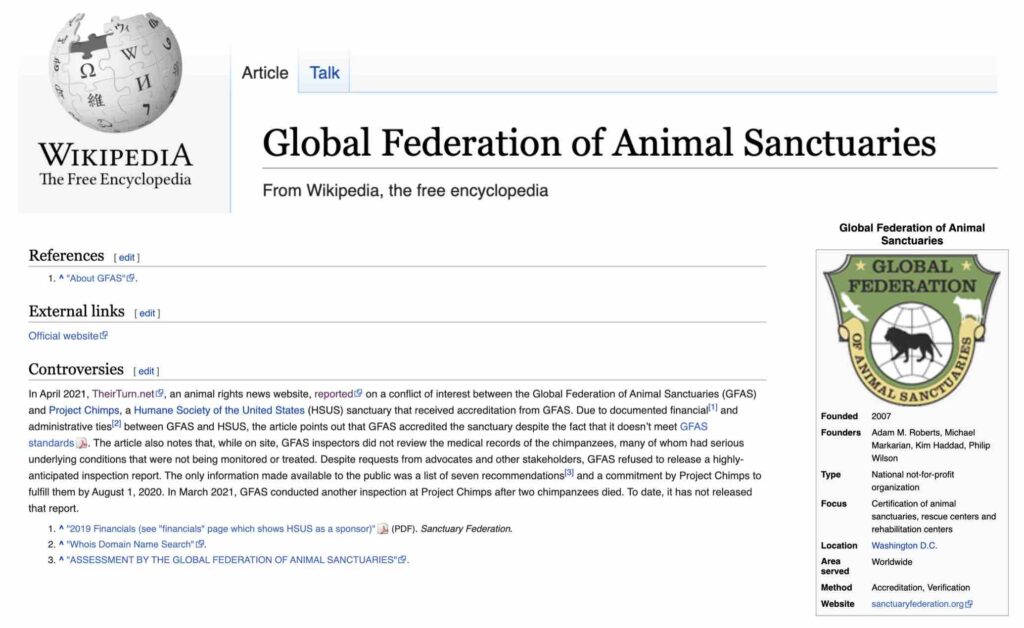
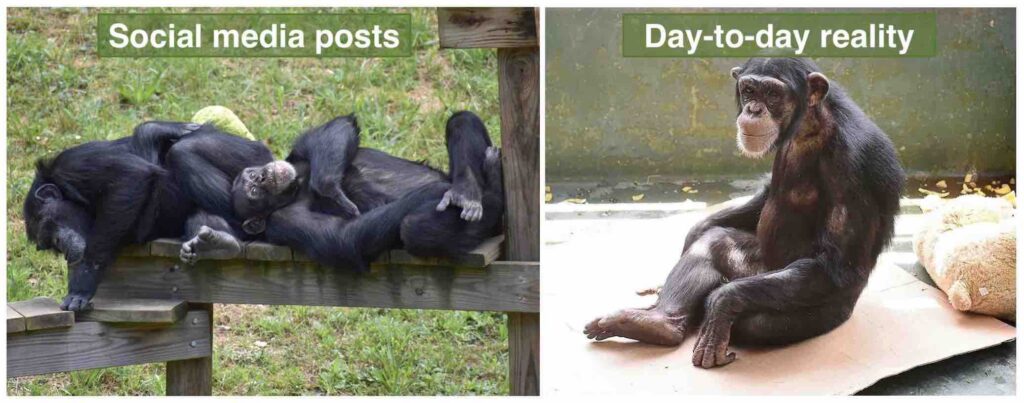
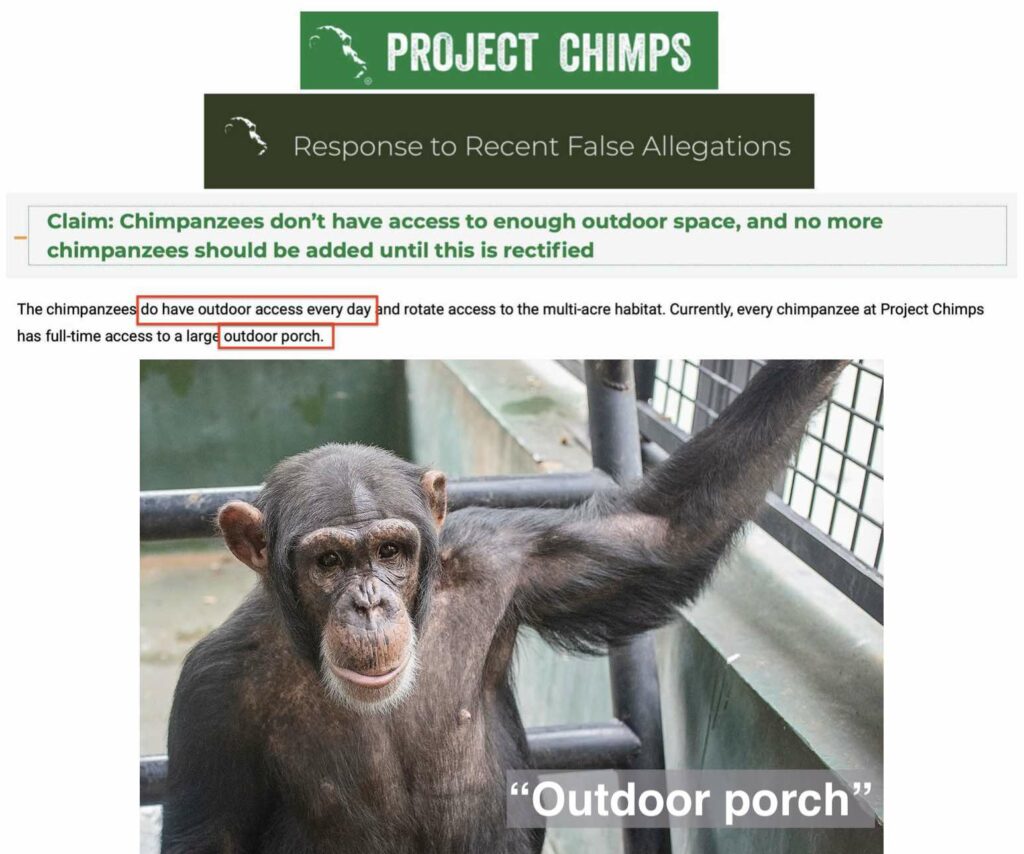
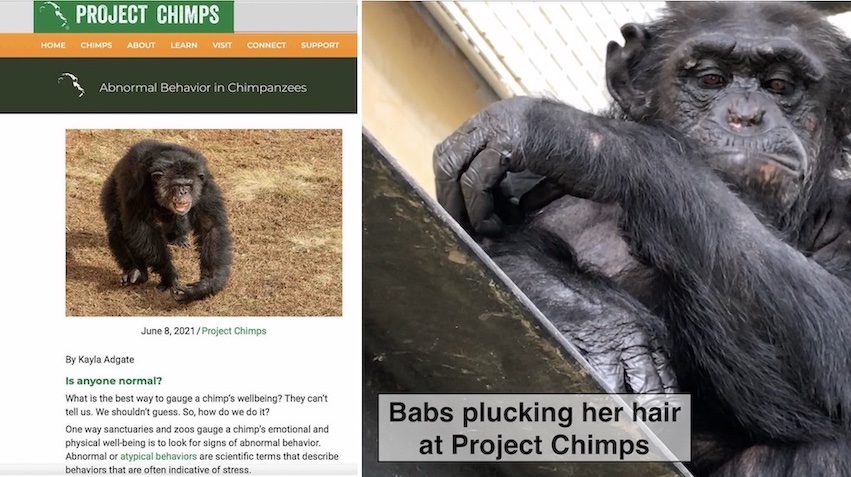
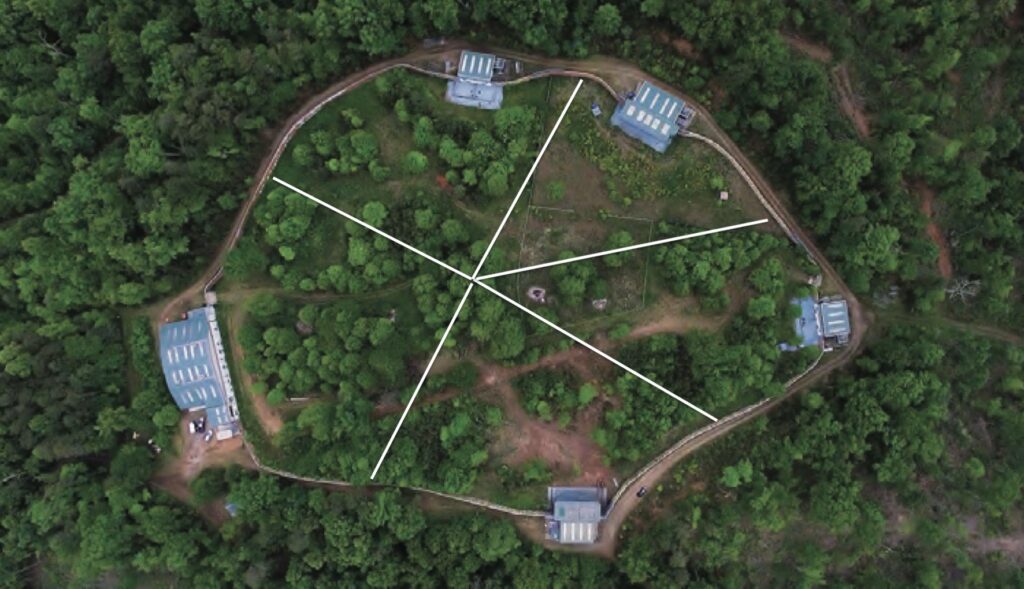
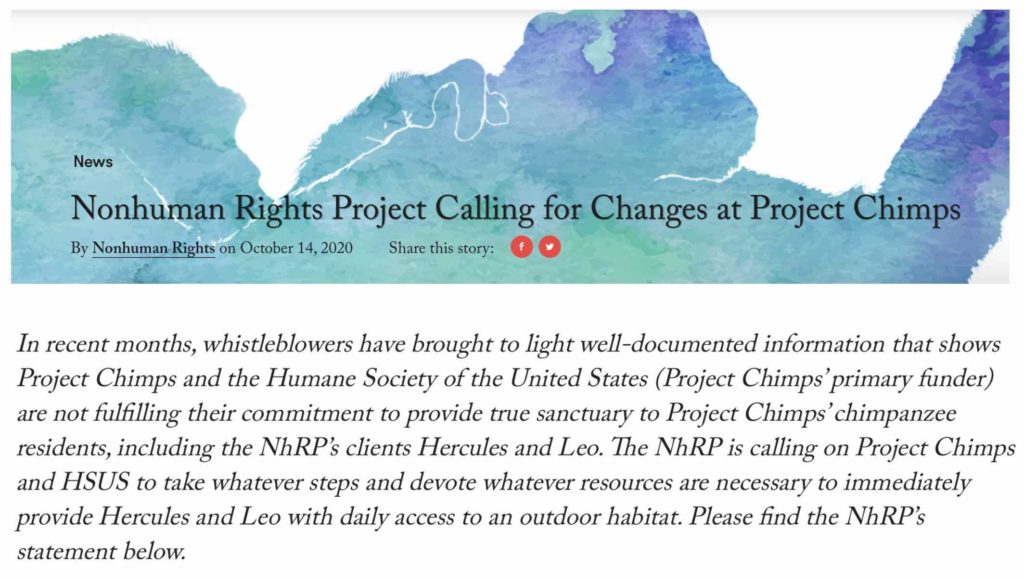
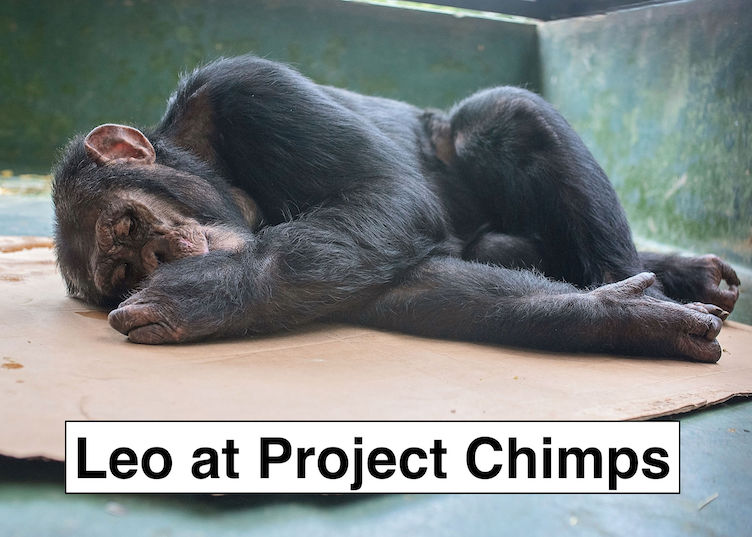
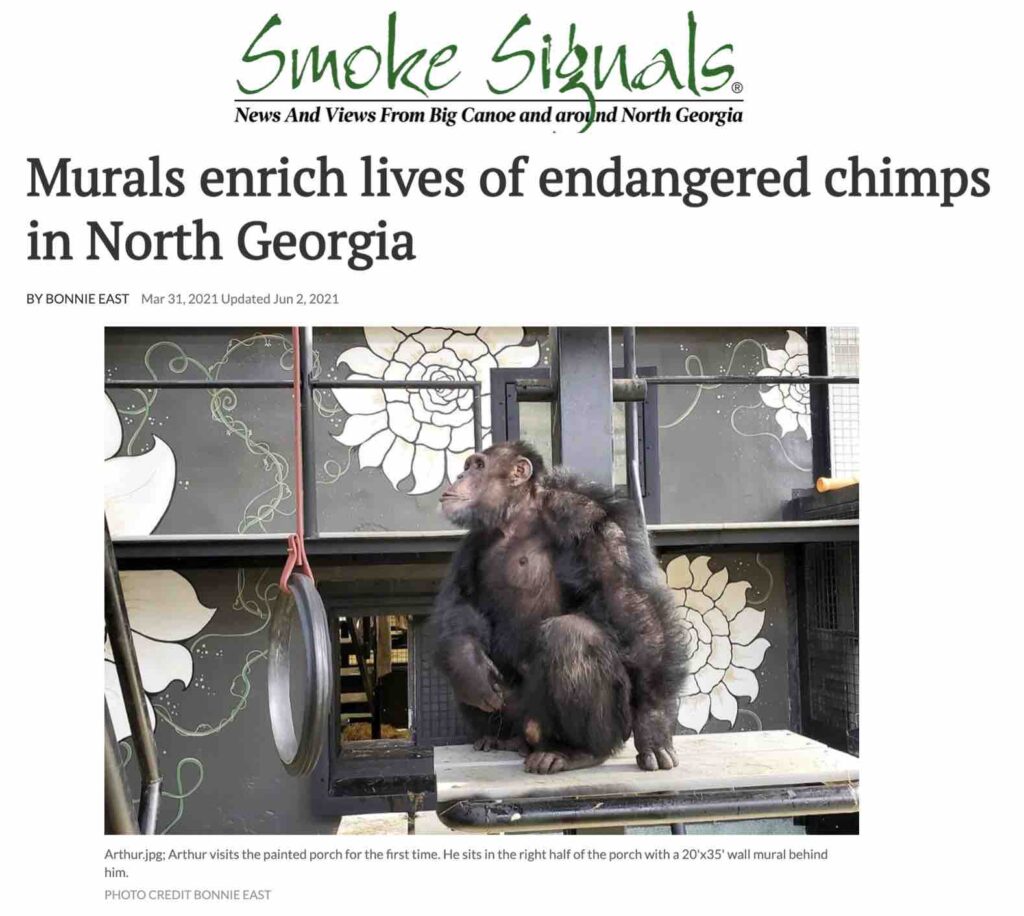
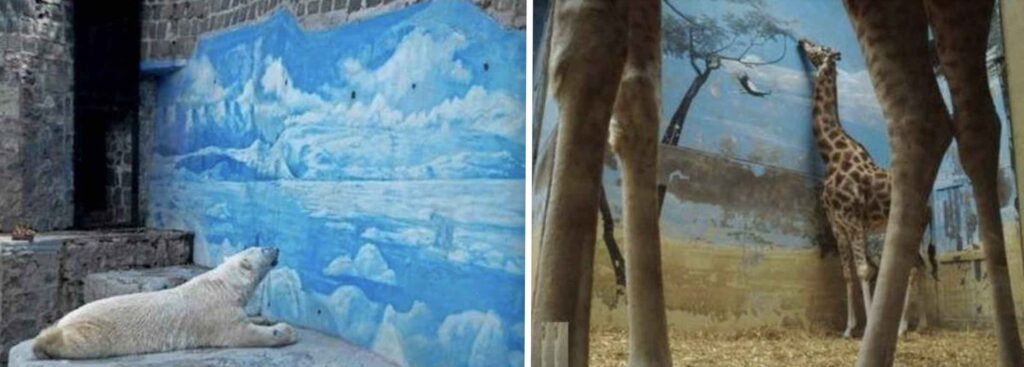
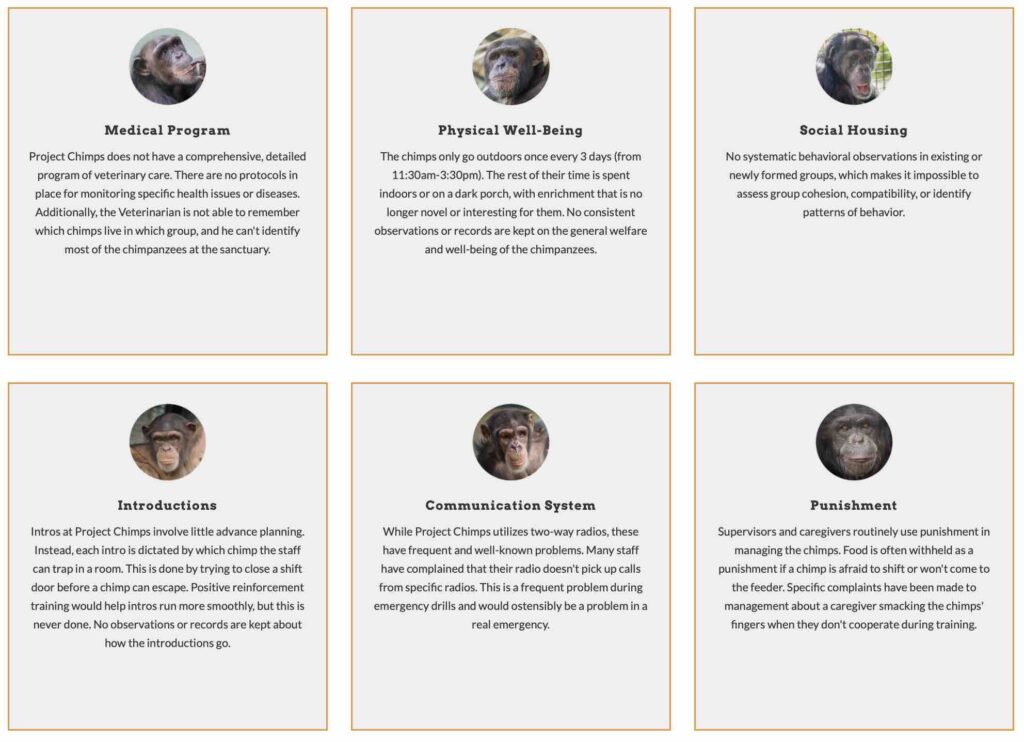
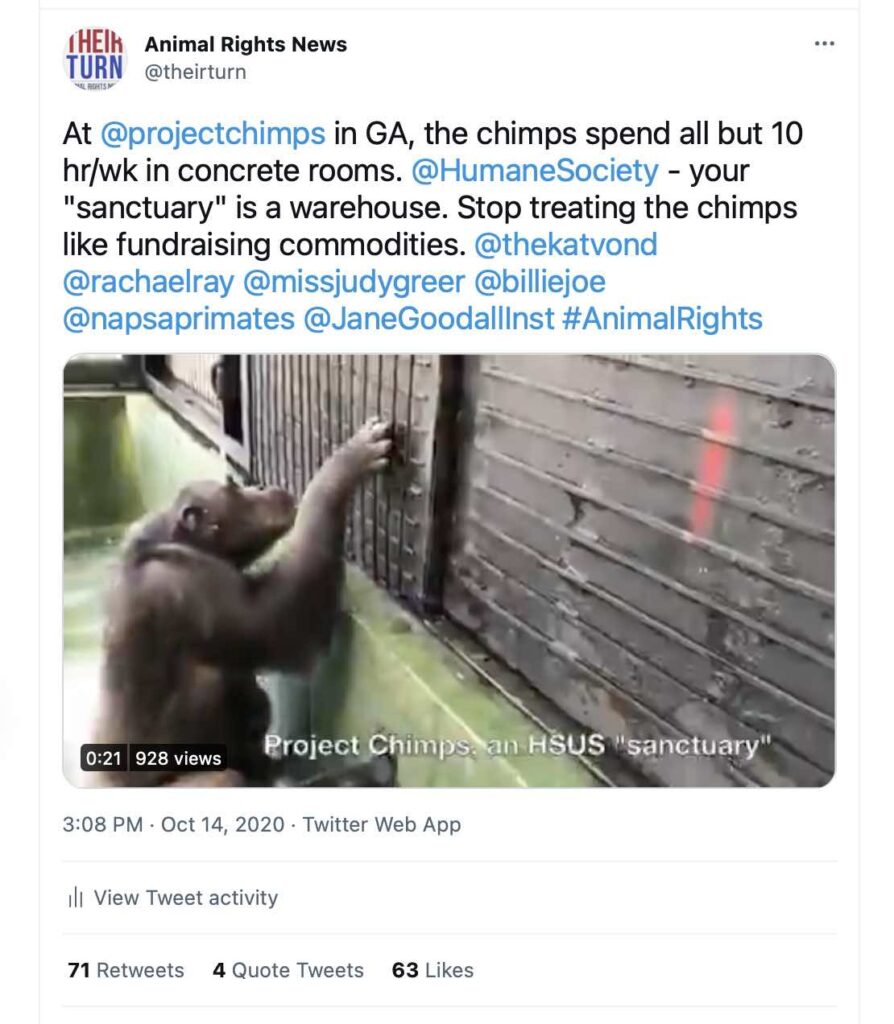

Follow Their Turn